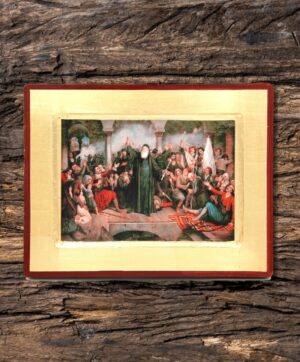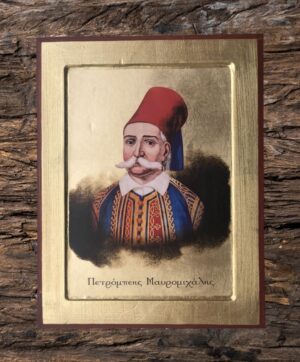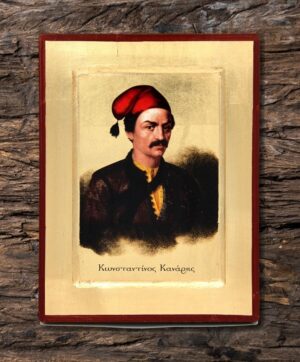Description
He was born in 1797, in the settlement of Avoritis in Krokileio, Fokida and his family name was Triantaphyllos and diligently at a young age at the suggestion of his mother for fear of further retaliation, because his father Dimitris had been killed, under unclear circumstances, in a clash with the Turks when Makrygiannis was one year old.
His revolutionary activity
In 1820 he was initiated into the Society of Friends and a few days after the start of the Revolution he was arrested by the Turks in Arta. However, he quickly escaped and joined the body of Chief Gogos Bacolas.
He took part in the battles of Stavros (August 4, 1821) and in the siege of Arta (November 12 – December 4, 1821).
On July 4, 1822, he fought at the Battle of Peta, where he was slightly wounded in the leg. On January 1, 1823, Makrygiannis was appointed “Guardian of Public Order” in liberated Athens.
In the summer of 1823 he fought with Nikitaras in the battles of Velitsa and Petra and in October of the same year he was in the Peloponnese with the Roumeliotes and fought on the side of the government of Georgios Kountouriotis, during the civil war. For this action, in 1824 he was successively promoted to lieutenant general, lieutenant-general and general.
The “Constitution” and the political activity of Ioannis Makrygiannis
After his release, Makrygiannis was appointed by Ioannis Kapodistrias, Commander-in-Chief of the Peloponnese Executive Force. During this period and specifically on February 26, 1829, he began to write his “Memoirs”.
He then broke up with Kapodistrias and after his assassination, he sided with the so-called “Constitutionalists” against the brothers of Viaros and Augustinos Kapodistrias. He welcomed Otto’s arrival but soon came into conflict with both the Regency and the king himself.
From 1833 Makrygiannis was elected municipal councillor of Athens and in January 1837 as chairman of the municipal council, he suggested to the body the issuance of a resolution for the granting of a Constitution by Otto. For this action, he was stopped and placed under house arrest by order of Arminsberg.
The movement of September 3, 1843
Six years later he took an active part in the Revolution of September 3, 1843, which forced Otto to grant a constitution to his subjects. He played an active role in the National Assembly convened for this purpose on November 8, forming a group of 63 deputies (proxies).
On April 13, 1852, he was accused of plotting to assassinate Otto and was placed under house arrest. In March 1853 he was tried and sentenced to death. His sentence was commuted to life imprisonment and in September 1854 he was pardoned and released.
He died on April 27, 1864 at the age of 67.








